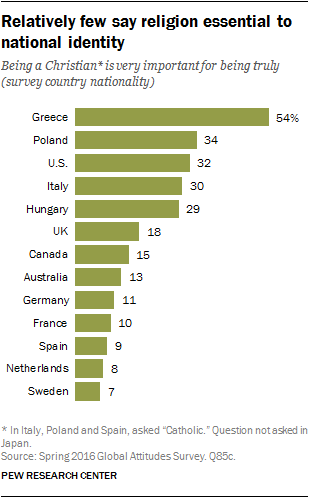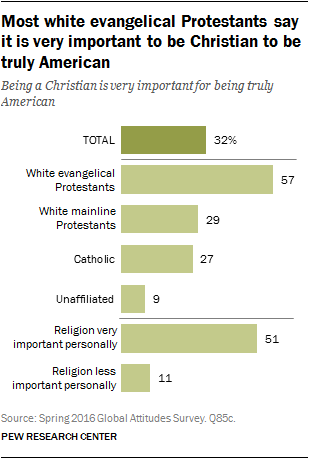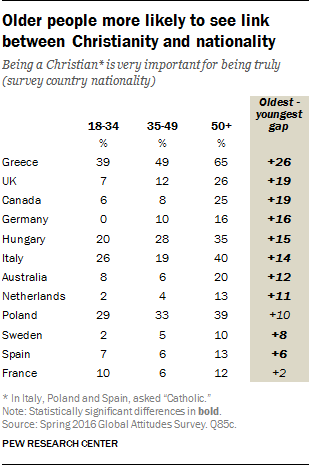 In all countries except Japan, the survey asked respondents whether being Christian or Catholic (reflecting religious traditions in the countries polled) was important to national identity. Across the 13 countries where the question was asked, a median of just 15% say it is very important to be Christian in order to be a true national. Only in Greece do more than half (54%) hold this view, while in Sweden fewer than one-in-ten (7%) make a strong connection between nationality and Christianity.
In all countries except Japan, the survey asked respondents whether being Christian or Catholic (reflecting religious traditions in the countries polled) was important to national identity. Across the 13 countries where the question was asked, a median of just 15% say it is very important to be Christian in order to be a true national. Only in Greece do more than half (54%) hold this view, while in Sweden fewer than one-in-ten (7%) make a strong connection between nationality and Christianity.
Religion and the sense of being ‘truly American’
 In 2014, Christians accounted for 70.6% of the U.S. population. Non-Christians and those unaffiliated with any religion totaled 28.7%.
In 2014, Christians accounted for 70.6% of the U.S. population. Non-Christians and those unaffiliated with any religion totaled 28.7%.
About a third (32%) of Americans say it is very important for a person to be a Christian in order to be considered truly American. Roughly three-in-ten (31%) contend that one’s religion is not at all important.
Perhaps not surprisingly, the link between religion and nationality is of greatest consequence to those for whom religion plays a very important role in daily life. Among this group, 51% say it is very important to be Christian in order to be truly American. For those respondents who say religion for them is only somewhat important, not too important or not important at all, just 11% say Christian identity is very important to being American.
There is also a denominational divide on the relationship between Christianity and nationality. A majority (57%) of white evangelical Protestants say it is very important to be Christian to be a true American. Just 29% of white mainline Protestants and 27% of Catholics agree. Only 9% of people who are unaffiliated with an organized religion say it is very important for a person to be Christian in order to be truly American.
Generations are divided on this question, with those 50 and older placing far greater importance on being a Christian (44% say it is very important) than Americans under 35 (18%).
Men and women slightly differ on religion’s importance in American identity. More than a third (36%) of women say it is very important for a person to be a Christian; roughly a quarter (27%) of men concur.
Views on Christianity and nationality also differ along educational lines. People with a high school education or less (44%) are more than twice as likely as people with at least a college degree (19%) to voice the view that it is very important that one is Christian in order to be American.
Religion and national identity in Europe, Canada and Australia
There are widely disparate views on the importance of religion to national identity in Europe. In Greece, 54% believe it is very important to be Christian to be considered a true national. In contrast, in two countries – Spain (57%) and Sweden (57%) – majorities actually say religion it is not at all important to national identity.
 Views of the importance of religion to nationality often divide along generational lines. People ages 50 and older are significantly more likely than those ages 18 to 34 to say that being Christian is very important to national identity. This generation gap is largest in Greece: 65% of older Greeks say it is very important but only 39% of younger Greeks agree. The differential is 18 percentage points in the UK, 16 points in Germany and 15 points in Hungary.
Views of the importance of religion to nationality often divide along generational lines. People ages 50 and older are significantly more likely than those ages 18 to 34 to say that being Christian is very important to national identity. This generation gap is largest in Greece: 65% of older Greeks say it is very important but only 39% of younger Greeks agree. The differential is 18 percentage points in the UK, 16 points in Germany and 15 points in Hungary.
People on the right of the ideological spectrum are more likely to view religion as very important to nationality. This right-left divide is particularly prominent in Greece (26 points) and Poland (21 points). The ideological left is quite secular in Germany (just 5% say religion is very important to nationality) and Spain (6%). By comparison, a greater share of people on the left in Greece (40%), Hungary (26%), Italy (24%) and Poland (21%) say being Christian is very important to be truly Greek, Hungarian, Italian or Polish.
Only 13% of Australians believe that it is very important for a person to be a Christian in order to be truly Australian. Roughly half (48%) think it is not important at all. Australians who put themselves on the right of the political spectrum (19%) are nearly five times as likely as those on the left (4%) to place great importance on religious belief as a qualification for being a true Australian. In addition, older Australians (20%) are more than twice as likely as the younger generation (8%) to link Christianity with national identity. Less educated Australians (19%) are also more likely than those with more education (9%) to make this connection.
Only 15% of Canadians think being Christian is very important to national identity. People ages 50 and older (25%) are roughly four times as likely as Canadians ages 18 to 34 (6%) to think that being Canadian is dependent upon being a Christian. Similarly, about four times as many people on the right (21%) as on the left (5%) think being Christian is very important to being Canadian. And Canadians with a secondary education or less (22%) are twice as likely as those with more than a secondary education (10%) to link religion with national identity.


